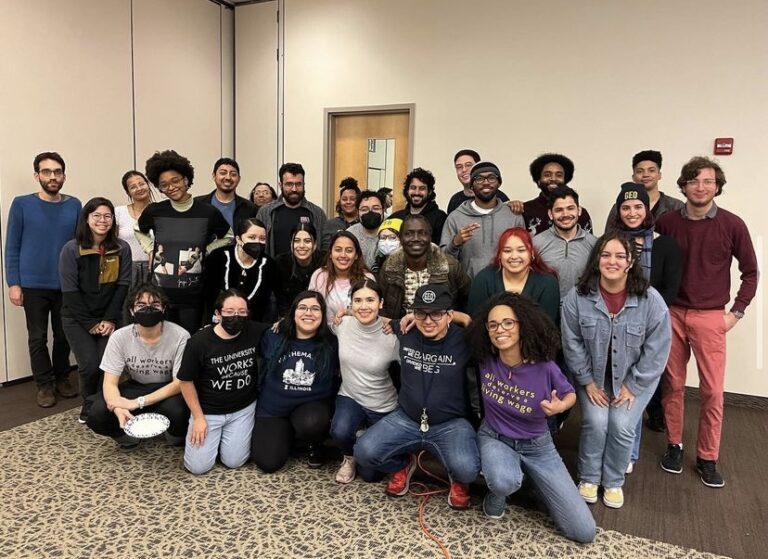CHAMPAIGN—On a rainy Friday evening around 5 p.m., the Ikenberry dining hall at the University of Illinois Urbana-Champaign was quiet. That was until the sounds of clapping and people cheering filled the second floor.
Members of the Graduate Employees’ Organization jumped around and hugged as news broke that they finally had a new contract.
In August of 2022, their previous contract expired. While they were already five months into negotiations, they hadn’t reached an agreement with the administration.
Now, 26 bargaining sessions and a year later, they’ve finally reached an end-point
In March, they ratified their new 4-year contract. It passed with 98 percent approval from club members.
Karla Sanabria-Veaz, the GEO’s co-president, said the community she worked with kept her going.
“Organizing is an act of love, and you can’t love it if you don’t have a community to love with and to love for,” she said.
According to the GEO, more than 150 student workers showed up at the final bargaining session.
Sanabria-Veaz said seeing all those people support the GEO’s cause was one of her proudest moments at the University.
“The one thing that they do not have that we have is numbers, and community, the workers will always care more, the workers will always have each other’s back more,” she said.
Key changes in the contract include a 25 percent increase in wages over the next four years, including retroactive payment for 2022.
According to the GEO, this is the highest increase in wages for graduate workers at the University, ever.
The contract also features more comprehensive healthcare including greater coverage for dependents and various fee waivers for international students.
Addey Connor, a student trustee nominee for University and close collaborator with the GEO has worked with graduate employees at the Krannert Center for the Performing Arts Center for two years.
She said the increase in wages is huge, especially for those supporting a family.
“A lot of grad students, they’re married, they have kids, and things that they need to take care of,” she said, “so they need good health insurance, they need childcare, they need enough money to pay for family expenses.”
Christine Riordan, an assistant professor at the University’s School of Labor and Employment relations, echoed this sentiment.
She said her research has shown that the presence of unions can greatly lessen economic inequality by allowing workers a chance to advocate for themselves.
However, their ability to organize hasn’t always been guaranteed.
Over the last twenty years, the National Labor Relations Board has waffled on whether graduate workers are legally considered employees or students.
Under the Trump administration, for example, board members proposed a ruling to once again classify them as students. In 2021, the proposal was ultimately shut down.
“We’ve seen a real resurgence of a lot of grad students organizing and really strong unions, for that reason in recent years in particular,” Riodan said.
She also said that for as much labor as they perform on campus, their ability to unionize is imperative.
“They are involved as teaching assistants, as graders, as research assistants, so they are essentially workers at the University in addition to being students and undertaking their graduate degrees,” she said.
However, not every graduate worker at the University feels overworked.
Bhavika Kagarthi, a bioengineering masters student, said most of the people she works with in her department feel fairly compensated.
“Most of us TAs don’t ever work more than 10 hours a week and our professors are extremely flexible,” Kagarthi said.
She explained that the department heads have always been understanding of their status as workers and students.
University spokesperson, Robin Kaler, said in an email that these types of complaints made wage the top priority in recent months.
Kaler said the University is proud of the agreement they’ve been able to reach with the union.
Sanabria-Veaz, the Union’s co-president, said she was also happy with the agreement, but that there’s still room for improvement.
In addition to higher wages, other major changes include increased paid parental leave time and greater healthcare coverage for dependents.

